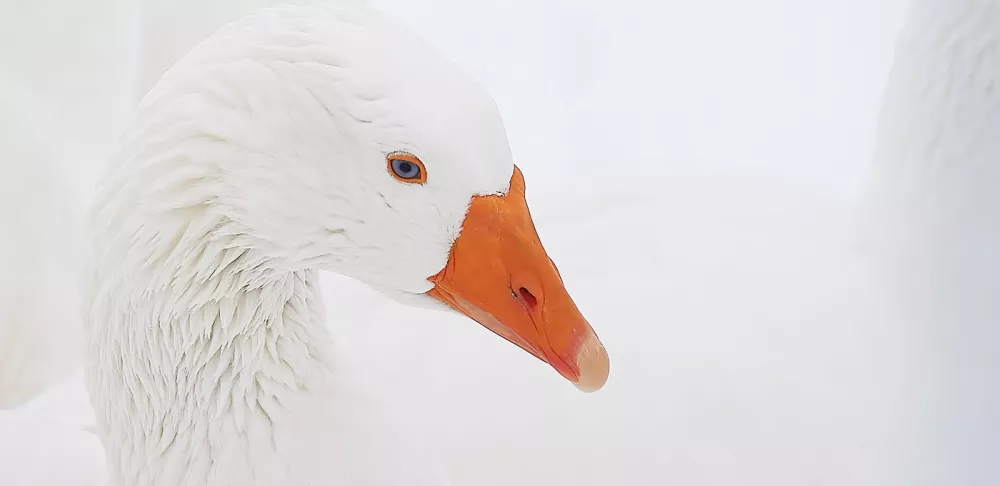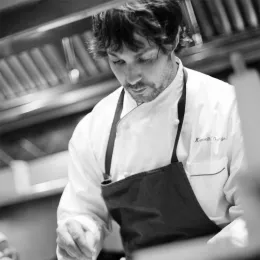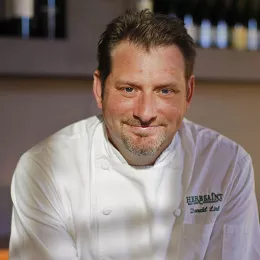Foie gras. Pâté. Offal. These niche food items may be familiar to us today, but in 1985, these products were unknown to many Americans. That is, until Ariane Daguin launched D’Artagnan, an inspired idea that became one of the largest and most trusted specialty meat distributors in the country. In celebration of the company’s 30th anniversary, we recently invited the visionary founder and CEO to ICE as part of our Meet the Culinary Entrepreneurs series.

Born in the Gascony region of France to a family with a seven-generation culinary legacy—including a chef father with 2 Michelin stars to his name—it was clear from early on that Ariane had inherited a passion for the food industry. Yet, despite growing up with this impressive gastronomical heritage, her original career ambition was to become a journalist, a dream she pursued by enrolling as an undergraduate at Columbia University.
During her summers off from school, Ariane worked the retail counter at Les Trois Petits Cochons, which was—and still is—one of New York’s finest French pâté producers. When she suggested to the owners that they should sell their products wholesale to the city’s fine food shops, amazingly, they presented her with the opportunity to develop this concept within their existing business. Meanwhile, at Columbia, Ariane had met George Faison—her future business partner.
Joining Ariane and her friends on weekly restaurant outings, George realized they shared one very special passion: French cuisine. Soon enough, he joined Ariane at Les Trois Petits Cochons while he was finishing his MBA. Working together, the two gained invaluable experience in the industry over the next five years. But when the shop’s owners decided that Ariane’s entrepreneurial ideas—in particular, becoming the sole foie gras distributor for a duck farm in the Catskills—were too risky, the pair knew it was time to branch off on their own.

The timing couldn’t have been better. At the time, there was no fresh, domestic foie gras available in the country—American chefs were cooking it out of a can. With a specific mission in mind, the two launched D’Artagnan (named after one of the Three Musketeers, a book penned by Alexandre Dumas, with whom Ariane shares her hometown). Draining their savings, the pair leased a truck and a small refrigeration space, and gained an exclusive contract with the Catskills duck farm to sell foie gras. “The first few years were extremely difficult. It was hard to receive cash flow. Banks didn’t want to lend anything since there was no guarantee. At one point, we had $35 in the bank,” said Daguin.
To stay viable, they had to convince the foie gras farmers that they were the right people for the job. Ariane threw everything she had into her work. Knowing that it would be met with hesitation from the public, she invested time in educating clients about the product. And since foie gras was a relatively unfamiliar ingredient for chefs, D’Artagnan kept two days' inventory on hand, to allow for last-minute orders. This, Ariane knew, would give their clients the freedom to be more daring with the specialty ingredient, testing the waters as they gauged their guests’ reactions.

In addition, Ariane was taught by her father that a good chef knows how to use the whole animal, so she sought out chefs with a similar perspective. George and Ariane began to develop relationships with these chefs, who provided checks as credit to receive foie gras in the future. Those crucial partnerships allowed the company to get one step ahead. Ariane’s vision for D’Artagnan also began to re-shape the farming practices of her producers. She wanted to be able to market D’Artagnan’s products as fresh, free-range, and organic, but felt she still needed something to set her foie gras apart. Ariane begged her farmers to raise heritage duck breeds. These would take longer to raise—nine months, as opposed to the traditional five—and it took all of Ariane’s powers of persuasion to convince the farmers that this time-consuming change would be a worthwhile investment. At the same time, Ariane was growing her network at the other end of the food chain, tapping into a new generation of ambitious New York City chefs.

Her primary customers were young culinary innovators, such as Patrick Clark of Odeon, David Burke, and Daniel Boulud. Growing her inventory to include game birds and other specialized products, Ariane provided chefs with access to a whole new world of high-quality products, distinguishing D’Artagnan as a unique resource for this ambitious culinary community.
Today, Ariane is one of the most respected women in the food industry. She works with chefs, restaurateurs, and purveyors from across the country—some offering ideas for new product offerings, while others make requests for such rare products as charcuterie, truffles, or mushrooms. D’Artagnan, in turn, has become one of the most successful specialty food companies in the industry, with 172 employees, 35 trucks and 82 million dollars in revenue.
Though she and George parted ways in the early 2000’s, Ariane has since taken D’Artagnan to new heights. The business now has an outpost in Chicago and is about to open a third location in Houston. But despite her ambitions, Ariane also knows her limits—she may be a master of sourcing, but she has no desire to open her own slaughterhouse. Ariane wisely believes the key to her success is that she knows what she does best, and sticks to it with passion, integrity, and honesty.
For more success stories from the industry's top entrepreneurs, click here.




